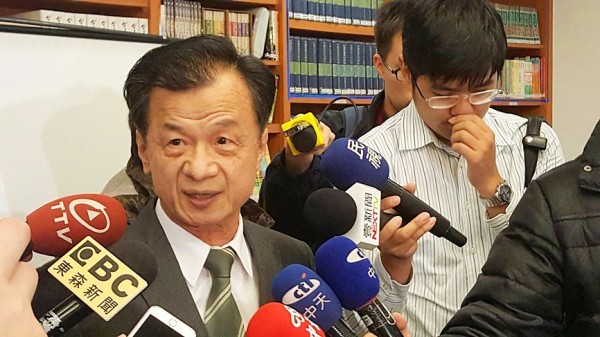《TAIPEI TIMES》 New Party spokesman’s live broadcast contravened the law, top officials said

Minister of Justice Chiu Tai-san talks to reporters at the Administrative Enforcement Agency yesterday, expressing support for prosecutors’ detention of New Party spokesman Wang Ping-chung on Monday. Photo: Wen Yu-te, Taipei Times
LINES: Wang Ping-chung’s broadcast of officers outside his home is not a breach of the law, but once a search warrant was issued he was breaking the rules: law expert
By Jason Pan and Sean Lin / Staff reporters
New Party Youth Corps spokesman Wang Ping-chung (王炳忠) has broken the law by live broadcasting a search of his house conducted by law enforcement officers, top justice officials and legal experts said.
Wang on Tuesday live streamed Ministry of Justice Investigation Bureau officers as they tried to enter his residence.
The law prohibits any live broadcasting of judicial action, Minister of Justice Chiu Tai-san (邱太三) said yesterday.
“During a judicial probe, it is necessary to maintain the confidentiality of a case under investigation. However, the live broadcast revealed information relating to the case to the public,” Chiu said.
“Live broadcasting is different from taking photographs, which are used to preserve a scene. The photographs are not disclosed to the public,” Chiu said.
“Live broadcasting provides information directly to the public, so this action has contravened the principle of maintaining confidentiality and is therefore not permitted by law,” he said.
“Maybe Wang’s live broadcast was an attempt to inform his colleagues that he was being searched; a warning that they should flee,” political commentator Yao Li-ming (姚立明) said yesterday.
Wang’s action might constitute a leak of classified information of an ongoing judicial investigation, collusion with others to conceal evidence, or an obstruction of law enforcement officers, Yao said.
Leaking classified information is punishable with a maximum of three years in prison, lawyer Chao Wen-ming (趙文銘) said.
When Wang refused to open the door to police, the investigation had not yet started, so the live broadcast did not breach the law, Chao said.
“However, when police and officials entered the apartment and showed search warrants, Wang continued the live broadcast,” he added.
If Wang did not cooperate with law enforcement officers and threatened or reacted physically, then prosecutors could charge Wang for obstructing officers, Chao said.
Wang has accused officials of breaking the law by not allowing his lawyer to enter his apartment during the search, Chao said.
“If a case is under investigation, officials can seal off a location under investigation and prevent lawyers from entering the area,” he said. “It is only during a trial hearing that the law requires the presence of a lawyer. These are two different situations, so Wang is mistaken.”
The methods used are not so different from other cases under investigation, lawyer Dennis Lei (雷皓明) said.
“Under the Code of Criminal Procedure (刑事訴訟法), people are usually arrested by warrant if they fail to show up after being summoned,” Lei said, adding that a law enforcement agency usually issues a subpoena at least 24 hours before a person of interest is required to appear.
“However, in practice, prosecutors often show up a person’s door to issue a subpoena, and if they refuse to be summoned, an arrest warrant is issued on the spot,” he said. “That does not constitute a procedural violation.”
The pan-blue camp is mixing two separate issues by saying that officers entered the four men’s homes two hours earlier than the time they were scheduled to be summoned, as a search is fundamentally different than a subpoena, he said.
However, Taipei prosecutor Lin Chun-ting’s (林俊廷) arrest warrants were excessive, as the four New Party members were listed as witnesses, not defendants, Lei said.
Similarly, the use of any coercive means of disposition, such as searching and arresting witnesses, is rare, as witnesses are defined as “third parties” under legal procedure, he said.
“Because the people involved in the incident are controversial, it highlights problems in investigative procedure,” he said.
新聞來源:TAIPEI TIMES




















